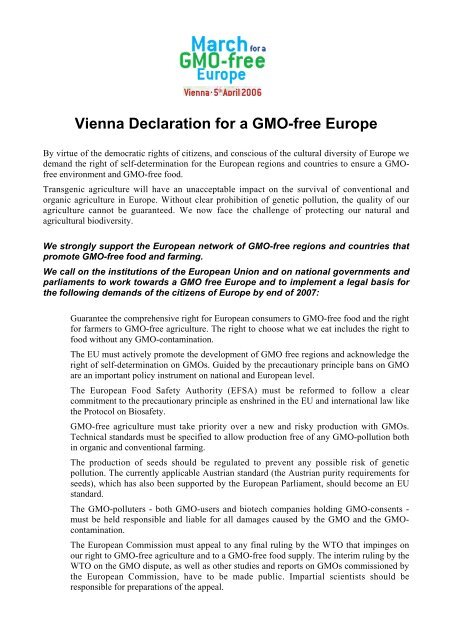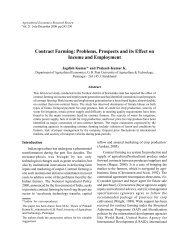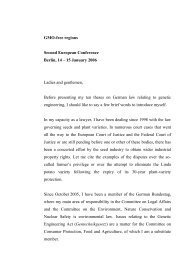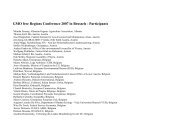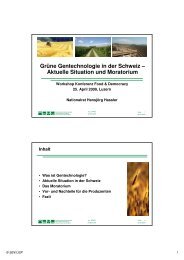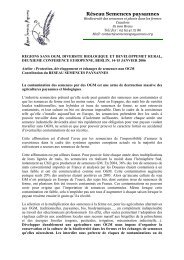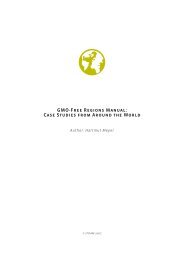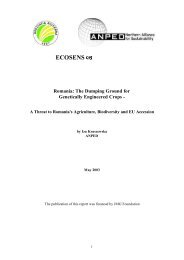Vienna Declaration for a GMO-free Europe - GMO-free Regions
Vienna Declaration for a GMO-free Europe - GMO-free Regions
Vienna Declaration for a GMO-free Europe - GMO-free Regions
You also want an ePaper? Increase the reach of your titles
YUMPU automatically turns print PDFs into web optimized ePapers that Google loves.
<strong>Vienna</strong> <strong>Declaration</strong> <strong>for</strong> a <strong>GMO</strong>-<strong>free</strong> <strong>Europe</strong><br />
By virtue of the democratic rights of citizens, and conscious of the cultural diversity of <strong>Europe</strong> we<br />
demand the right of self-determination <strong>for</strong> the <strong>Europe</strong>an regions and countries to ensure a <strong>GMO</strong><strong>free</strong><br />
environment and <strong>GMO</strong>-<strong>free</strong> food.<br />
Transgenic agriculture will have an unacceptable impact on the survival of conventional and<br />
organic agriculture in <strong>Europe</strong>. Without clear prohibition of genetic pollution, the quality of our<br />
agriculture cannot be guaranteed. We now face the challenge of protecting our natural and<br />
agricultural biodiversity.<br />
We strongly support the <strong>Europe</strong>an network of <strong>GMO</strong>-<strong>free</strong> regions and countries that<br />
promote <strong>GMO</strong>-<strong>free</strong> food and farming.<br />
We call on the institutions of the <strong>Europe</strong>an Union and on national governments and<br />
parliaments to work towards a <strong>GMO</strong> <strong>free</strong> <strong>Europe</strong> and to implement a legal basis <strong>for</strong><br />
the following demands of the citizens of <strong>Europe</strong> by end of 2007:<br />
• Guarantee the comprehensive right <strong>for</strong> <strong>Europe</strong>an consumers to <strong>GMO</strong>-<strong>free</strong> food and the right<br />
<strong>for</strong> farmers to <strong>GMO</strong>-<strong>free</strong> agriculture. The right to choose what we eat includes the right to<br />
food without any <strong>GMO</strong>-contamination.<br />
• The EU must actively promote the development of <strong>GMO</strong> <strong>free</strong> regions and acknowledge the<br />
right of self-determination on <strong>GMO</strong>s. Guided by the precautionary principle bans on <strong>GMO</strong><br />
are an important policy instrument on national and <strong>Europe</strong>an level.<br />
• The <strong>Europe</strong>an Food Safety Authority (EFSA) must be re<strong>for</strong>med to follow a clear<br />
commitment to the precautionary principle as enshrined in the EU and international law like<br />
the Protocol on Biosafety.<br />
• <strong>GMO</strong>-<strong>free</strong> agriculture must take priority over a new and risky production with <strong>GMO</strong>s.<br />
Technical standards must be specified to allow production <strong>free</strong> of any <strong>GMO</strong>-pollution both<br />
in organic and conventional farming.<br />
• The production of seeds should be regulated to prevent any possible risk of genetic<br />
pollution. The currently applicable Austrian standard (the Austrian purity requirements <strong>for</strong><br />
seeds), which has also been supported by the <strong>Europe</strong>an Parliament, should become an EU<br />
standard.<br />
• The <strong>GMO</strong>-polluters - both <strong>GMO</strong>-users and biotech companies holding <strong>GMO</strong>-consents -<br />
must be held responsible and liable <strong>for</strong> all damages caused by the <strong>GMO</strong> and the <strong>GMO</strong>contamination.<br />
• The <strong>Europe</strong>an Commission must appeal to any final ruling by the WTO that impinges on<br />
our right to <strong>GMO</strong>-<strong>free</strong> agriculture and to a <strong>GMO</strong>-<strong>free</strong> food supply. The interim ruling by the<br />
WTO on the <strong>GMO</strong> dispute, as well as other studies and reports on <strong>GMO</strong>s commissioned by<br />
the <strong>Europe</strong>an Commission, have to be made public. Impartial scientists should be<br />
responsible <strong>for</strong> preparations of the appeal.
These demands are based on the following necessities and facts:<br />
The right to food <strong>free</strong> from genetic modification<br />
All of us have the right to choose food without genetically modified organisms (<strong>GMO</strong>). Decisions about the<br />
use of reproductive material in a common environment cannot be made individually, as they affect all of us,<br />
because the living environment belongs to each and everyone. Decisions concerning the use of <strong>GMO</strong> and<br />
the structuring of agriculture in countries and regions should not be imposed by particular farmers,<br />
bureaucrats or companies. The use of <strong>GMO</strong>s in nature is irreversible.<br />
Protection, Precaution and Independent risk research<br />
The consumption of genetically modified food by millions of people is like a large and uncontrolled<br />
experiment, which could have unexpected consequences. Concerns about new allergens, antibiotic<br />
resistance, pesticide exposure etc. are being raised by medical experts. Biotech research and risk assessment<br />
must not be left in the hands of the biotech industry. We strongly condemn the use of people and animals<br />
throughout the world as guinea-pigs <strong>for</strong> <strong>GMO</strong>s in food.<br />
Coexistence is impossible<br />
Coexistence between genetically modified and <strong>GMO</strong>-<strong>free</strong> farming in <strong>Europe</strong>an agriculture is not possible,<br />
just like there is no coexistence between silence and noise in a room. Local plants and their wild relatives<br />
there<strong>for</strong>e require the highest standards of protection. Coexistence projects must not be facilitated by allowing<br />
routine <strong>GMO</strong> contamination – “a bit” GM-<strong>free</strong> is not acceptable.<br />
The <strong>GMO</strong>-users as well as the biotech companies holding <strong>GMO</strong> consents must be held responsible and liable<br />
<strong>for</strong> all damage caused.<br />
Purity requirements <strong>for</strong> seeds<br />
Seeds are positioned at the beginning of the food chain. Without <strong>GMO</strong>-<strong>free</strong> seeds there cannot be <strong>GMO</strong>-<strong>free</strong><br />
farming and no <strong>GMO</strong>-<strong>free</strong> food. Furthermore, alternative farming systems such as organic farming are<br />
endangered by <strong>GMO</strong>-contaminated seeds. There<strong>for</strong>e no contamination of seeds by <strong>GMO</strong>s can be allowed<br />
(such as in the Austrian purity law). The rigorous Austrian law <strong>for</strong> <strong>GMO</strong>-<strong>free</strong> seeds should become an EUstandard.<br />
Local seed diversity, traditional plant varieties and their wild relatives provide respective regions with their<br />
character, taste and heritage. This allows diversity to develop and increase including that of <strong>GMO</strong>-<strong>free</strong> seeds.<br />
There is a real risk that genetic contamination will cause widespread and irreversible damage to traditional<br />
plant varieties and seed lines, causing great loss to our biodiversity and cultural heritage.<br />
Regional farming policy must include the right to protect traditional and locally adapted plant varieties, the<br />
right to <strong>GMO</strong>-<strong>free</strong> farming and the conservation and use of traditional seeds.<br />
Our food sovereignty and labelling<br />
The overwhelming majority of <strong>Europe</strong>ans do not want genetically modified food. Responding to the demand<br />
<strong>for</strong> <strong>GMO</strong>-<strong>free</strong> food and farming is an essential part of a Region’s food sovereignty and economic<br />
development. Regional authorities must be able to protect quality labels, purity standards, organic products,<br />
and designations of origin in a competitive manner. This includes in particular the access to <strong>GMO</strong>-<strong>free</strong> seeds<br />
as well as to <strong>GMO</strong>-<strong>free</strong> animal feed.<br />
Sustaining Agricultural Biodiversity<br />
Farming is an integral part of our regional way of life. The vast majority of <strong>Europe</strong>an countries wish to<br />
promote sustainable and organic farming and regional marketing <strong>for</strong> their rural development. The right of<br />
self determination of regions and countries and the right to farm without <strong>GMO</strong>s must be legally safeguarded<br />
by the EU.<br />
<strong>Vienna</strong>, April 5 th 2006,<br />
The”<strong>Vienna</strong> <strong>Declaration</strong> <strong>for</strong> a <strong>GMO</strong>-<strong>free</strong> <strong>Europe</strong>” is pronounced by the plat<strong>for</strong>m organising the march <strong>for</strong> a<br />
<strong>GMO</strong>-<strong>free</strong> <strong>Europe</strong>


